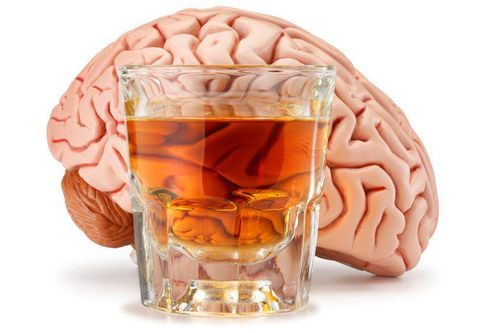This is an automatically translated article.
Vietnam is one of the countries with the highest percentage of alcohol users in the world today. Beer or wine are beverages containing ethanol with different concentrations, such as beer containing about 5% alcohol, wine containing about 9 - 16% alcohol, spirits containing more than 20% alcohol. Ethanol is the ingredient that will cause the main harmful effects when we drink alcohol and beer.
1. What organs does alcohol pass through and how does it "destroy" the body?
After entering the body from the mouth, alcohol will enter the stomach, small intestine, penetrate into the circulatory system, follow the blood to the brain, kidneys, lungs and liver. These are the parts that will be damaged by alcohol, specifically as follows:
For the mouth: alcohol will irritate the mucosa in the oral cavity, when the alcohol concentration is high, it will increase the risk of cancer of the mouth and throat. For the stomach: when entering the stomach, alcohol will permeate through the stomach lining without participating in the digestive process like other foods. If you drink alcohol on an empty stomach, that is when there is no food in the stomach, alcohol will be absorbed into the blood most quickly. When the stomach contains food, especially foods with high protein content, the rate of alcohol absorption will slow down but not stop completely. In addition, mixing alcohol with carbonated drinks will speed up the absorption of alcohol into the blood, which is increasingly common, especially among young people. When drinking too much or drinking alcohol with high alcohol content, the concentration of alcohol and gastric juice in the stomach will increase, causing irritation to the gastric mucosa, at this time the body will have a vomiting reflex to reduce the condition. irritation state. Those who regularly drink alcohol on an empty stomach can cause ulcers, even stomach bleeding. About 20% of alcohol is absorbed in the stomach, the remaining 80% will be absorbed in the small intestine to put into the blood.

2. Drink alcohol the right way
Recommended video:
Guide to detecting and first aid for alcohol poisoning
Daily dose of alcohol: the amount of alcohol absorbed is calculated based on the alcohol concentration of the drink and the volume of the drink according to the following formula : Volume (ml) x concentration (%) x 0.79 (which is the conversion factor) will give the number of alcohol units. One unit of alcohol (alcohol) is 10g of pure alcohol, equivalent to 3⁄4 cans of 330ml beer, equivalent to 135ml of wine and equivalent to 30ml of whiskey. It is recommended that men should not drink more than 2 units of alcohol per day, and women should not drink more than 1 unit of alcohol per day. When drinking should drink slowly, drink slowly to reduce irritation of the oral mucosa and stomach, and at the same time give the liver enough time to oxidize alcohol thereby reducing the risk of drunkenness, alcohol poisoning. Before drinking alcohol should drink filtered water or fruit juice, soup, broth, eat food, especially green vegetables to dilute the alcohol concentration, reduce stomach irritation. When drinking alcohol, you should eat foods that contain a lot of protein to slow down the absorption of alcohol into the blood. Do not drink alcohol on an empty stomach. Do not drink alcohol with carbonated beverages.

Uống rượu đúng cách giúp bạn bảo vệ cơ thể
Do not drink alcohol with aspirin: aspirin is a pain reliever, anti-inflammatory. People who drink alcohol can get headaches, so some people take aspirin before drinking to increase their tolerance. This is a very dangerous job because Aspirin can cause stomach bleeding on an empty stomach and it also increases the absorption of alcohol into the blood, causing the blood alcohol concentration to rise rapidly. Therefore, people who are taking aspirin should avoid drinking alcohol. Alcohol should not be taken with caffeine. Because alcohol is an inhibitor that slows down brain activity and impairs the ability to communicate, think, and walk. While caffeine is a stimulant that increases heart rate and increases blood pressure, some people think that using caffeine when drinking alcohol will sober up. However, this is a huge misconception and extremely dangerous because caffeine can cause a fast heartbeat and irregular heartbeat, it can also cause headaches, nausea, agitation and problems with breathing. stomach, abnormal breathing. When drinking both alcohol and caffeine at the same time, there will be no neutralization between the inhibitor and the stimulant, but on the contrary, the drinker can develop toxic shock syndrome (Oxic Jock Syndrome) which can lead to death.

Không nên uống rượu cùng với caffeine
In the last days of the year, everyone is trying to complete work, prepare to welcome the new year, parties, year-end celebrations, and inevitable New Year's Eve glasses. But each of us needs to be aware of the dangers of alcohol, then limit it to the maximum and know how to drink alcohol properly to limit the harmful effects of alcohol on health.
Customers can directly go to Vinmec Health system nationwide to visit or contact the hotline here for support.
Reference article source: National Institute of Nutrition
MORE:
How to calculate blood alcohol concentration Fatty liver caused by alcohol How does alcohol affect the liver?













